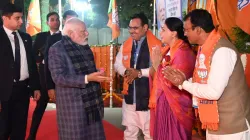'People are God, give up ego': PM Modi to newly elected MLAs in Rajasthan
Prime Minister Narendra Modi met all the newly elected MLAs in Rajasthan as he visited BJP office in Jaipur for the fist time after becoming the PM. He asked them to start preparing for Lok Sabha elections.

Jaipur: Prime Minister Narendra Modi on Friday visited BJP office in Jaipur and met office-bearers and newly elected MLAs. This is Modi's first visit to the party office in Jaipur since becoming prime minister. He interacted with all the newly elected BJP MLAs in Rajasthan and told them that people are God, leave your ego. The Prime Minister spent around 2-3 hours with the lawmakers and asked them to start preparing for upcoming Lok Sabha elections.
PM Modi gave the message of good governance to the new government and stressed that there should be no ego while running the government. Continuous work should be done on what can be improved for the welfare of the common man.
There are 25 Lok Sabha seats in Rajasthan. To make sure BJP wins all of them, PM Modi asked BJP leaders, MLAs and ministers to start preparing for it.
He further told them to take government schemes to the people and make them aware about its benefits.
PM Modi asked many MLAs about their area and talked about the glorious history of Rajasthan. He sat along with CP Joshi, who is MP from Chittorgarh, and talked about its history.
The Prime Minister specifically told ministers that he never transferred anyone nor got angry, if you will come late to office, then your officers will too... government will change but officers will remain the same.
In the dinner, millet, maize, barley (breads), khichdi were served.
PM Modi to address conference of DGPs and IGPs
The Prime Minister is also expected to address a conference of DGPs and IGPs from across the country being held in the city.
The prime minister arrived at Jaipur airport, where he was received by Governor Kalraj Mishra and Chief Minister Bhajan Lal, among others. He left the airport for the party office amid tight security.
BJP leader Rajendra Rathore told reporters at the airport that Modi will interact with the party's office-bearers and MLAs and have dinner with them. Modi will go to Raj Bhavan from the BJP office and spend the night there.
ALSO READ | Why is Chinese media praising PM Modi's 'successful' foreign policy? Explained